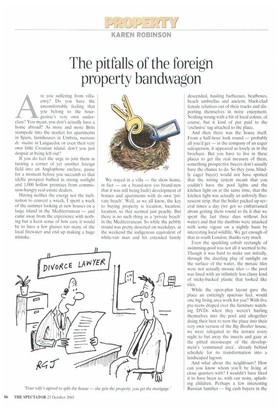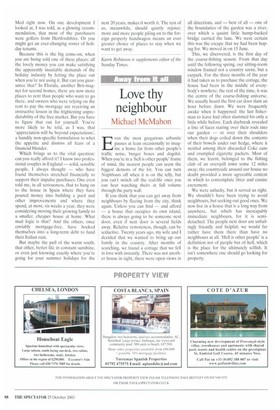The pitfalls of the foreign property bandwagon
Are you suffering from villaenvy? Do you have the uncomfortable feeling that you belong to the bourgeoisie's very own underclass? You mean, you don't actually have a home abroad? As more and more Brits stampede into the market for apartments in Spain, farmhouses in Umbria, maisons de maitre in Languedoc or even their very own little Croatian island, don't you just despair at being left out?
If you do feel the urge to join them in turning a corner of yet another foreign field into an Anglophone enclave, pause for a moment before you succumb to that idyllic prospect bathed in strong sunlight and 1,000 hollow promises from commission-hungry real-estate dealers.
Having neither the energy nor the inclination to convert a wreck, I spent a week of the summer looking at new houses on a large island in the Mediterranean — and came away from the experience with nothing but a keen sense of how easy it would be to have a few glasses too many of the local firewater and end up making a huge mistake.
We stayed in a villa — the show home, in fact — on a brand-new (so brand-new that it was still being built) development of houses and apartments with its own 'private beach'. Well, as we all know, the key to buying property is location, location, location, so that seemed just peachy. But there is no such thing as a 'private beach. in the Mediterranean. So while the pebbly strand was pretty deserted on weekdays, at the weekend the indigenous equivalent of white-van man and his extended family
descended, hauling barbecues, beatboxes, beach umbrellas and ancient, black-clad female relatives out of their trucks and disporting themselves in noisy enjoyment. Nothing wrong with a bit of local colour, of course, but it kind of put paid to the 'exclusive' tag attached to the place.
And then there was the house itself. From a half-hour look round — probably all you'd get — in the company of an eager salesperson, it appeared as lovely as in the brochure. But you have to live in these places to get the real measure of them, something prospective buyers don't usually have the chance to do. So they (you, blindly eager buyer) would not have spotted that the wiring system meant that you couldn't have the pool lights and the kitchen light on at the same time, that the kitchen light was actually an unlovely fluorescent strip, that the boiler packed up several times a day (we got so embarrassed about getting them round to fix it that we spent the last three days without hot water) and that the dustbins were attacked with some vigour on a nightly basis by interesting local wildlife. We get enough of that in south London, thanks very much.
Even the sparkling cobalt rectangle of swimming-pool was not all it seemed to be. Though it was hard to make out initially, through the dazzling play of sunlight on the surface of the water, the mosaic tiles were not actually mosaic tiles — the pool was lined with an infinitely less classy kind of sticky-backed plastic that looked like tiles.
While the open-plan layout gave the place an enticingly spacious feel, would one big living area work for you? With five pre-teens draped over the furniture watching DVDs when they weren't hurling themselves into the pool and altogether doing their best to turn the place into their very own version of the Big Brother house, we were relegated to the terrace every night to bat away the insects and gaze at the pitted moonscape of the development's 'communal area', already behind schedule for its transformation into a landscaped lagoon.
And what about the neighbours? How can you know whom you'll be living at close quarters with? I wouldn't have liked it to have been us, with our noisy, splashing children. Perhaps a few interesting Russian families — big cash buyers in the Med right now. On one development I looked at, I was told, as a glowing recommendation, that most of the purchasers were golfers from Hertfordshire. Or you might get an ever-changing roster of holiday tenants.
Because this is the big come-on, when you are being sold one of these places: all the lovely money you can make satisfying the apparently insatiable demands of the holiday industry by letting the place out when you're not using it. But can you guarantee that? In Florida, another Brit-magnet for second homes, there are now more places to rent than people who want to go there, and owners who were relying on the rent to pay the mortgage are receiving an instructive lesson in the frightening unpredictability of the free market. But you have to figure that out for yourself. You're more likely to be told, as I was, that 'appreciation will be beyond expectations', a handily non-specific formulation to whet the appetite and dismiss all fears of a financial blunder.
Which brings us to the vital question: can you really afford it? I know two professional couples in England — solid, sensible people, I always thought — who have found themselves stretched financially to support their impulse purchases. One even told me, in all seriousness, that to hang on to the house in Spain where they have poured money into building a pool and other improvements and where they spend, at most, six weeks a year, they were considering moving their growing family to a smaller, cheaper house at home. What mad logic is that? And the others, once enviably mortgage-free, have hocked themselves into a long-term debt to fund their Italian ruin.
But maybe the pull of the warm south, that other, better life in constant sunshine, or even just knowing exactly where you're going for your summer holidays for the next 20 years, makes it worth it. The rest of us, meanwhile, should quietly rejoice: more and more people piling on to the foreign property bandwagon means an ever greater choice of places to stay when we want to get away.
Karen Robinson is supplements editor of the Sunday Times.



































































































 Previous page
Previous page